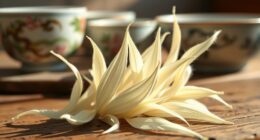As a tea enthusiast, I was instantly captivated by turmeric tea. Its bright color and distinct flavor are appealing, and the various health benefits it offers make it an excellent choice for enhancing overall well-being.
But as I started experimenting with making my own turmeric tea at home, I began wondering: what else can I add to this already delicious and nutritious brew?
After some research and experimentation, I’ve compiled a list of ingredients that not only enhance the flavor of turmeric tea but also provide their own set of health benefits.
So if you’re curious about what you can put in your turmeric tea or want to mix things up from your usual recipe, keep reading!
Key Takeaways
- Fresh turmeric root provides more health benefits than turmeric powder, and can be chopped and boiled in water for a basic turmeric tea recipe
- Adding ginger, cinnamon, and cardamom to turmeric tea enhances its properties and provides unique flavor combinations
- Coconut milk and almond milk are great dairy-free alternatives that offer numerous health benefits and can be used to add creaminess to turmeric tea
- Sweetening turmeric tea with honey or maple syrup enhances its natural sweetness and provides additional health benefits, while lemon juice can enhance digestion and increase vitamin C intake.
Benefits of Turmeric Tea
You’ll be surprised at how many health benefits you can reap from sipping on a warm cup of turmeric tea. This ancient spice has been used for thousands of years in traditional medicine, and now modern research is proving its effectiveness in reducing inflammation and boosting the immune system.
Turmeric contains a compound called curcumin which has powerful antioxidant properties that help to fight free radicals in the body. Some research suggests that consuming up to 500mg of curcumin per day may provide health benefits such as improved brain function and reduced risk of heart disease. However, it’s important to note that most studies have used high doses of curcumin supplements rather than just drinking turmeric tea.
As with any herbal supplement or medication, it’s best to consult with your healthcare provider before adding turmeric or curcumin to your daily routine.
Now let’s explore the differences between using fresh turmeric root versus turmeric powder in making your own cup of tea.
Turmeric Powder vs. Fresh Turmeric Root
Using fresh turmeric root in your tea can provide more health benefits than using turmeric powder. The root contains higher levels of curcumin, which is the active compound found in turmeric that has been linked to numerous health benefits. These benefits include reducing inflammation and improving brain function.
While turmeric powder does contain some curcumin, it typically only makes up about 3% of the total weight of the powder. On the other hand, fresh turmeric root can contain up to 5-6% curcumin.
In addition to providing more health benefits, using fresh turmeric root in your tea can also add a unique flavor profile. There are many turmeric tea recipes available online that incorporate fresh ginger, honey, lemon or cinnamon to enhance the taste and nutritional value of the beverage.
Now that we know why using fresh turmeric root is preferable over using powdered form for our tea, let’s move on to discussing a basic recipe for making this healthy drink at home.
Basic Turmeric Tea Recipe
To create a simple and flavorful beverage with the powerful benefits of fresh turmeric root, try this easy recipe for brewing your own cup of golden elixir.
Start by washing and peeling a thumb-sized piece of fresh turmeric root. Grate or finely chop the turmeric into small pieces.
Next, bring 2 cups of water to a boil in a small pot or kettle. Add the chopped turmeric to the boiling water and reduce heat to low.
Allow the mixture to simmer for about 10 minutes, stirring occasionally. Remove from heat and strain out any remaining solid pieces using a fine mesh strainer or cheesecloth.
Enjoy this basic recipe as is, or experiment with different types of tea blends that incorporate turmeric tea brewing methods.
For those who want extra flavor and health benefits beyond just turmeric, adding ginger can be an excellent option. Ginger adds its own unique flavor profile while also providing anti-inflammatory properties and aiding digestion.
Simply add a few slices of fresh ginger root to the mix during the simmering process for an added kick of goodness!
Adding Ginger for Extra Flavor and Health Benefits
If you want to add an extra burst of flavor and health benefits to your golden elixir, try tossing a few slices of fresh ginger root into the mix while it simmers. Ginger is a popular spice that not only adds a zesty kick to your turmeric tea but also packs a punch when it comes to health benefits.
It contains compounds like gingerol and shogaol that have potent anti-inflammatory effects, making it useful for combating arthritis, migraines, and other inflammatory diseases. Moreover, ginger has been shown to improve digestion, reduce nausea and vomiting, lower blood sugar levels, and boost immunity.
To enhance the taste of your ginger-infused turmeric tea further, you can add a squeeze of lemon juice or honey for sweetness. One simple recipe is to bring water (1-2 cups) and sliced fresh ginger (1-2 inches) to boil in a pot. Then add 1 tsp turmeric powder or grated fresh turmeric root and simmer for about 10 minutes. Finally, strain the mixture into a cup and enjoy with lemon juice or honey as desired.
With this recipe, you can savor the spicy warmth of ginger while reaping its abundant health benefits. Adding cinnamon for warm and spicy flavor will take your turmeric tea up another level.
Cinnamon for a Warm and Spicy Flavor
Get ready to add a warm and spicy twist to your golden elixir with the addition of cinnamon. Not only does cinnamon bring a delicious flavor to turmeric tea, but it also provides numerous health benefits.
Here are four reasons why you should consider adding cinnamon to your next cup of turmeric tea:
-
Cinnamon has anti-inflammatory properties that can help reduce swelling and inflammation in the body.
-
It may help regulate blood sugar levels, making it a great addition for those with diabetes or at risk for developing the disease.
-
Cinnamon is rich in antioxidants, which can protect against damage caused by free radicals and reduce the risk of chronic diseases.
-
Combining cinnamon with honey can provide added immune-boosting benefits, while adding lemon can enhance digestion and increase vitamin C intake.
As you sip on your warm cup of turmeric tea infused with cinnamon and honey, get ready for another delightful twist – cardamom for a sweet and aromatic taste.
Cardamom for a Sweet and Aromatic Taste
Indulge in the sweet and aromatic flavors of cardamom, adding a touch of luxury to your turmeric tea experience. Cardamom is a popular spice used in many cuisines around the world for its unique taste and aroma. It has a warm, sweet flavor with hints of citrus and mint that complement the earthy taste of turmeric perfectly.
Adding cardamom to your turmeric tea can also bring some health benefits. Cardamom is known to have antioxidant properties that may help reduce inflammation and improve digestion. It’s also believed to have antimicrobial effects that can help fight against harmful bacteria in the body. So not only does it make your tea taste great, but it could also provide some added health benefits as well.
As you sip on this flavorful beverage, you may find yourself wanting to add a touch of sweetness to balance out the spices. Find out next how you can sweeten your turmeric tea without compromising its health benefits.
Sweetening Your Turmeric Tea
Enhance the natural sweetness of this flavorful beverage by adding a touch of honey or maple syrup to your turmeric tea. These natural sweeteners not only provide a delicious taste but also offer various health benefits that refined sugar lacks.
Honey, for instance, is rich in antioxidants and has antimicrobial properties, making it an excellent choice for boosting immunity and relieving sore throat. Maple syrup, on the other hand, contains minerals such as manganese and zinc, which are essential for maintaining healthy bones and immune system functions. It also has a lower glycemic index than cane sugar, which means it won’t cause sudden spikes in blood sugar levels.
By incorporating these natural sweeteners into your turmeric tea recipe, you can create a comforting and indulgent experience that will leave your taste buds satisfied while reaping the benefits of their nutritional value.
To add a creamy texture to your turmeric tea without compromising its health properties, consider adding milk to the mix. This addition creates a luscious drink that’s perfect for sipping on during cold days or after meals.
Adding Milk for a Creamy Texture
When it comes to making my turmeric tea creamier, I often turn to adding milk. Two great options for this are coconut milk and almond milk.
Both of these dairy-free alternatives provide a rich, velvety texture that complements the earthy flavors of the turmeric. Not only do they add a delicious taste, but they also offer numerous health benefits such as boosting immunity and aiding digestion.
Coconut Milk
Adding a splash of creamy coconut milk to your turmeric tea is like adding a sail to a boat, enhancing the flavor and taking it to new heights. Coconut milk is an excellent dairy alternative that can be used in many recipes, including curries, smoothies, and baked goods. Not only does it add a rich creaminess to any dish, but it also provides numerous health benefits due to its high content of medium-chain triglycerides (MCTs), known for boosting metabolism and promoting weight loss.
When incorporating coconut milk into your turmeric tea recipe, there are several ways to do so. Here are two sub-lists that provide ideas for making the perfect cup of turmeric tea with coconut milk:
-
Sub-List 1: Ways to Add Coconut Milk:
-
Use canned full-fat coconut milk for maximum creaminess.
-
Mix equal parts water and coconut milk for a lighter version.
-
Sub-List 2: Other Dairy Alternatives:
-
Almond Milk
-
Cashew Milk
For those who prefer a nuttier flavor profile or have allergies to coconuts, almond milk is another great option when making turmeric tea.
Almond Milk
One delicious dairy alternative to consider for your turmeric-infused beverage is almond milk. It provides a nutty and creamy taste that perfectly complements the earthy notes of turmeric. Almond milk contains healthy fats and minerals like magnesium, calcium, and potassium, making it an excellent choice for those who want to add more nutrients to their diet. Plus, it’s naturally free from lactose and casein, making it ideal for people with lactose intolerance or dairy allergies.
If you’re looking to sweeten your almond milk turmeric tea without using sugar, try adding a teaspoon of honey. Honey not only adds natural sweetness but also has anti-inflammatory properties that can complement the benefits of turmeric. Alternatively, if you prefer a completely dairy-free option for your tea, there are various brands of almond milk available in the market that don’t contain any animal products.
Now that we know how to make our base turmeric tea with either coconut or almond milk, let’s explore some variations to spice up this drink!
Turmeric Tea Variations
When it comes to turmeric tea, there are many variations you can try. Personally, I love Turmeric Chai which incorporates traditional chai spices like cinnamon and cardamom with the anti-inflammatory benefits of turmeric.
Another popular variation is Golden Milk, which includes coconut milk and honey for a creamy texture.
Lastly, Turmeric Latte is a trendy option that combines turmeric with espresso or coffee for an added energy boost.
Overall, these variations provide unique flavors while still offering the health benefits of turmeric.
Turmeric Chai
Turmeric chai, with its warm and fragrant spices, is the perfect way to cozy up on a chilly day. This turmeric tea recipe combines traditional Indian chai spices like cinnamon, cardamom, ginger, and cloves with the anti-inflammatory benefits of turmeric.
To make this delicious drink, simply boil water in a pot and add black tea leaves along with all the spices. Let it simmer for a few minutes before adding some milk and sugar (or your preferred sweetener) to taste.
Not only is turmeric chai a tasty beverage option, but it also has numerous health benefits thanks to its star ingredient – turmeric. Turmeric contains an active compound called curcumin that has been shown to have anti-inflammatory properties and may help reduce pain associated with conditions like arthritis.
Additionally, studies suggest that curcumin may have potential cancer-fighting properties as well as improve brain function.
Speaking of health benefits, another popular turmeric-based drink is golden milk.
Golden Milk
Golden milk is a creamy and delicious beverage made with turmeric, coconut milk, and other warming spices like cinnamon and ginger that has been touted for its potential anti-inflammatory properties. This traditional Ayurvedic drink has gained popularity in recent years due to its health benefits. Turmeric, the star ingredient of golden milk, contains curcumin which has been shown to have anti-inflammatory and antioxidant effects. It may also improve brain function, lower risk of heart disease, and potentially even prevent cancer.
Preparation methods for golden milk vary but typically involve simmering coconut milk or almond milk with turmeric powder, cinnamon, ginger, black pepper (which increases the absorption of curcumin), and sweetener such as honey or maple syrup. Some recipes also include additional ingredients like cardamom or vanilla extract. The resulting beverage is not only flavorful but also offers potential health benefits. As someone who enjoys trying new drinks that are both tasty and good for me, I am excited to explore another popular turmeric-based beverage: the turmeric latte.
Turmeric Latte
If you’re looking for a cozy and comforting beverage that also offers potential health benefits, try making a delicious turmeric latte at home! This warm and creamy drink is made with turmeric tea blends, milk of your choice, sweetener, and some spices such as cinnamon or ginger. It’s an easy recipe to follow and can be customized to suit your taste preferences.
Turmeric lattes have gained popularity in recent years due to the many health benefits associated with turmeric. Turmeric contains curcumin, a natural anti-inflammatory compound that may help reduce inflammation in the body. Additionally, it may help improve brain function and lower the risk of chronic diseases such as heart disease and cancer.
So not only is this latte delicious, but it could potentially provide some health benefits as well. Give it a try next time you’re craving something warm and comforting!
Frequently Asked Questions
Can turmeric tea help with weight loss?
Turmeric tea, paired with a healthy diet and exercise, may aid in weight loss by boosting metabolism. There are various turmeric tea recipes to try, such as adding lemon or honey. Evidence suggests it may offer some benefits, but consult with a healthcare professional before use.
Is it safe to consume turmeric tea during pregnancy?
As a healthcare professional, I recommend caution when consuming turmeric tea during pregnancy or while trying to conceive. While it has potential health benefits, some studies suggest it may have adverse effects on fertility and pregnancy outcomes.
Can turmeric tea be consumed for skin health benefits?
Did you know that the global anti-aging market is projected to reach $83 billion by 2027? Turmeric tea is a natural way to promote skin health with its anti-inflammatory and antioxidant properties. Incorporate it into your routine for a youthful glow.
How much turmeric tea should be consumed daily for optimal health benefits?
For optimal health benefits, I recommend consuming 1-2 cups of turmeric tea daily. Regular consumption can help reduce inflammation, improve brain function, and lower the risk of chronic diseases. Be mindful of your turmeric tea dosage as excessive intake may lead to side effects.
Can turmeric tea help with reducing inflammation and joint pain?
Yes, turmeric tea can aid in reducing joint pain and inflammation. Curcumin, the active ingredient in turmeric, has anti-inflammatory properties that may help alleviate symptoms. Drinking 1-2 cups daily is recommended for optimal health benefits.
Conclusion
In conclusion, turmeric tea is a wonderful addition to any diet. Not only does it offer numerous health benefits, but it also provides a warm and comforting beverage that can be enjoyed any time of day.
As I sip on my turmeric tea, I’m reminded of the vibrant yellow color of the spice and its ability to add brightness and flavor to any dish. Symbolically speaking, turmeric represents vitality and strength. Just as this spice brings life to our meals, it can also bring life to our bodies through its anti-inflammatory properties and potential cancer-fighting abilities.
So why not incorporate some turmeric tea into your daily routine? Your taste buds (and your body) will thank you for it.










